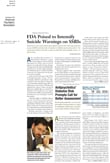Childhood conduct disorder has genetic inputs, various twin studies have revealed. In fact, genes may account for as much as 40 percent to 70 percent of the disorder, a Virginia twin study and an Australian twin study have suggested. But what specific genes might be at work here? Tatiana Foroud, Ph.D., an associate professor of medical and molecular genetics and psychiatry at Indiana University School of Medicine, and colleagues decided to search for an answer.
As they reported in the January Molecular Psychiatry, a genetic region on chromosome 19 and one on chromosome 2 look especially suspect.
During the 1990s, the Collaborative Study on the Genetics of Alcoholism was conducted to identify genes contributing to alcoholism. It included not just 1,227 individuals who were alcohol dependent, but at least two family members for each. As part of the study, all subjects aged 18 or older were interviewed using the Semi-Structured Assessment for the Genetics of Alcoholism (SSAGA). The SSAGA helps diagnose childhood conduct disorder through retrospective report of behavioral problems demonstrated before the age of 15. Thirteen percent of all these subjects met criteria for a childhood diagnosis of conduct disorder.
Foroud and her colleagues then decided to use from this study 114 sibling pairs concordant for childhood conduct disorder, in order to conduct their own investigation into the genetics of conduct disorder.
The researchers found that a particular genetic location on chromosome 19 yielded the strongest evidence of linkage with conduct disorder, and a particular genetic position on chromosome 2 turned out to have the next-strongest connection to the disorder.
The latter finding “is especially interesting,” Foroud and her team pointed out in their study report, “because this region of chromosome 2 also has been linked to alcohol dependence. . . .[In short] the overlap of the linkage findings for alcoholism and conduct disorder on chromosome 2 supports the suggestion from twin studies that conduct disorder and alcohol dependence partially share a genetic liability. . . .”
Added Samuel Kuperman, M.D., director of child psychiatry at the University of Iowa School of Medicine and another study co-author, “I think this is an exciting preliminary study that may lead to some future identification of the genes in conduct disorder. . . .This study needs to be replicated in a sample of subjects that was not selected due to a strong family history of alcoholism. Also, it would be important to do this study prospectively with children to see whether children who have these genetic markers have conduct disorder or develop conduct disorder during their adolescence.”
The study was funded by the National Institute on Alcohol Abuse and Alcoholism.
An abstract of the study, “A Genome-Wide Screen for Genes Influencing Conduct Disorder,” is posted online at www.nature.com/cgi-taf/DynaPage.taf?file=/mp/journal/v9/n1/abs/4001368a.html. ▪
